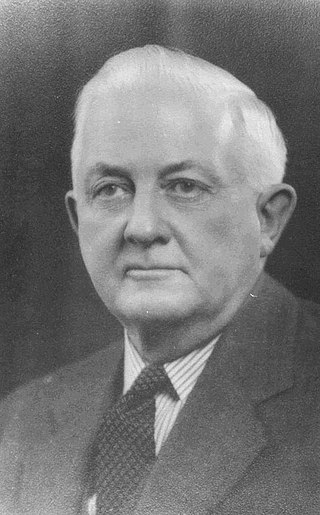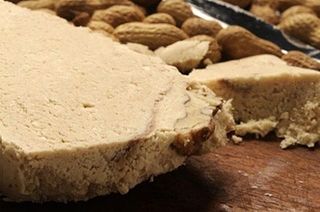
The peanut, also known as the groundnut, goober (US), goober pea, pindar (US) or monkey nut (UK), is a legume crop grown mainly for its edible seeds. It is widely grown in the tropics and subtropics by small and large commercial producers, both as grain legume and as an oil crop. Atypically among legumes, peanut pods develop underground leading botanist Carl Linnaeus to name peanuts hypogaea, which means "under the earth".

Peanut butter is a food paste or spread made from ground, dry-roasted peanuts. It commonly contains additional ingredients that modify the taste or texture, such as salt, sweeteners, or emulsifiers. Consumed in many countries, it is the most commonly used of the nut butters, a group that also includes cashew butter and almond butter.
Famine relief is an organized effort to reduce starvation in a region in which there is famine. A famine is a phenomenon in which a large proportion of the population of a region or country are so undernourished that death by starvation becomes increasingly common. In spite of the much greater technological and economic resources of the modern world, famine still strikes many parts of the world, mostly in the developing nations.

M&M's are color-varied sugar-coated dragée chocolate confectionery, each of which has the letter "m" printed in lower case in white on one side, consisting of a candy shell surrounding a filling which varies depending upon the variety of M&M's. The original candy has a semi-sweet chocolate filling which, upon introduction of other variations, was branded as the "plain, normal" variety. Peanut M&M's, which feature a peanut coated in milk chocolate, and finally a candy shell, were the first variation to be introduced, and they remain a regular variety. Numerous other variations have been introduced, some of which are regular widespread varieties while others are limited in duration or geographic availability. M&M's are the flagship product of the Mars Wrigley Confectionery division of Mars, Incorporated.

Skippy is an American brand of peanut butter manufactured in the United States and China. First sold in 1932, Skippy is currently manufactured by Hormel Foods, which bought the brand from Unilever in 2013. It is the best-selling brand of peanut butter in China and second only to the J.M. Smucker Company's Jif brand worldwide.

Peanut oil, also known as groundnut oil or arachis oil, is a vegetable oil derived from peanuts. The oil usually has a mild or neutral flavor but, if made with roasted peanuts, has a stronger peanut flavor and aroma. It is often used in American, Chinese, Indian, African and Southeast Asian cuisine, both for general cooking and in the case of roasted oil, for added flavor. Peanut oil has a high smoke point relative to many other cooking oils, so it is commonly used for frying foods.

Reese's Peanut Butter Cups are an American candy by the Hershey Company consisting of a peanut butter filling encased in chocolate. They were created on November 15, 1928, by H. B. Reese, a former dairy farmer and shipping foreman for Milton S. Hershey. Reese was let go from his job with Hershey when the Round Barn which he managed was shut down for cost-saving measures. He subsequently decided to start his own candy business. Reese's are a top-selling candy brand worldwide, with $3.1 billion in annual sales.

Kaolack is a town with a population of 298,904 on the north bank of the Saloum River about 100 kilometres (62 mi) from its mouth and the N1 road in Senegal. It is the capital of the Kaolack Region, which borders The Gambia to the south. Kaolack is an important regional market town and is Senegal's main peanut trading and processing center. As the center of the Ibrahimiyya branch of the Tijaniyyah Sufi order founded by Ibrayima Ñas, it is also a major center of Islamic education. The Leona Niassene mosque (right) in Kaolack is one of the largest and best known in Senegal.

Plumpy'Nut is a peanut-based paste in a plastic wrapper for treatment of severe acute malnutrition manufactured by Nutriset, a French company. Feeding with the 92-gram packets of this paste reduces the need for hospitalization. It can be administered at home, allowing more people to be treated.

The Peanut Butter Solution is a 1985 Canadian children's fantasy film directed by Michael Rubbo. The second installment in the Tales for All series of films by Les Productions La Fête, the film stars Mathew Mackay, Siluck Saysanasy, Alison Darcy, and Michael Hogan.
André Briend is a French pediatric nutritionist best known for his 1996 co-formulation of Plumpy'nut, a Ready-to-Use Therapeutic Food (RUTF), with Dr. Mark Manary. Starting in 1994, Briend, who at the time worked at Institut de recherche pour le développement, worked with Michel Lescanne to develop variants of renutrition products in solid form. At the time, the WHO-recommended diet for the treatment of severe malnutrition required clean water, a commodity only available in hospitals in most developing countries. These trial products were ultimately discarded for not meeting the requirements of good shelf-life, pleasant taste, or logistic simplicity. In 1996, inspired by a jar of chocolate spread which had a similar composition of proteins, energy, and lipids as the diet recommended by the WHO, Briend came up with the idea of replacing part of the dry skim milk in the existing recipe with peanut butter and eventually created Plumpy'nut. Briend also served as a medical officer for the Department of Child & Adolescent Health and Development at the World Health Organization.

Harry Burnett Reese was an American inventor and businessman known for creating Reese's Peanut Butter Cups, and founding the H. B. Reese Candy Company. In 2009, he was posthumously inducted into the Candy Hall of Fame.

Lion is a brand of chocolate bar currently owned and manufactured by Nestlé. The brand was originally introduced by British company Rowntree's in 1976. It consists of a filled wafer with caramel and cereals covered in milk chocolate.

Meds & Food for Kids is a nonprofit organization dedicated to treating and preventing child malnutrition in Haiti by producing fortified peanut-based foods. Meds & Food for Kids uses a peanut-based feeding approach called Ready-to-Use Therapeutic Food (RUTF), known as Medika Mamba.

Peanut stew or groundnut stew, also known as maafe, sauce d'arachide (French) or tigadèguèna is a stew that is a staple food in Western Africa. While maafe is a dish from Senegal, tigadéguéna originates from the Mandinka and Bambara people of Mali.

The peanut butter and banana sandwich (PB&B), or peanut butter, banana and bacon sandwich (PB,B&B), sometimes referred to as an Elvis sandwich, the Velvet Elvis, or simply the Elvis, is a sandwich with toasted bread, peanut butter, sliced or mashed banana, and occasionally bacon. Honey or jelly is seen in some variations of the sandwich. The sandwich is frequently cooked in a pan or on a griddle.

Mantecol is the brand name of a typical dessert of the cuisine of Argentina, a sort of semi-soft nougat made from peanut butter. It was originally created and marketed in the 1940s by the confectionery company Georgalos, founded by a Greek immigrant, Miguel Georgalos, who took inspiration from a dessert in Greek cuisine, halva.
Michel Lescanne is a French food processing engineer jointly responsible for the invention of the ready-to-use therapeutic food (RUTF) Plumpy'nut in 1996, and presently serves as President and Chief Executive Officer (CEO) of the French pharmaceutical manufacturer Nutriset.
Citadel spread is a paste made of peanut butter, oil, sugar and milk powder. First developed as a trail food for hikers, a citadel spread resembles common ready-to-use therapeutic food (RUTF) formulations, such as Plumpy'nut.
Patents for Humanity is an awards program run by the United States Patent and Trademark Office.















